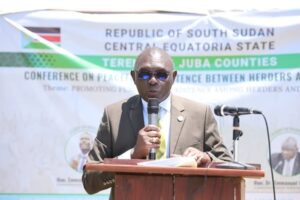
By Alan Clement
Central Equatoria State Minister of Peacebuilding, Jacob Aligo Lo-Lado, has called for urgent and collective efforts to resolve recurring conflicts between cattle herders and farmers.
Aligo made the remark on during the launch of a three-day peace conference between the communities from Terekeka and Juba counties of Central Equatoria state.
The conference under the theme “Promoting Peaceful Coexistence among Herders and Farmers, started on Wednesday August 27th, 2025, in Kuda, Terekeka county.
The event is meant to iron out the issues between Farmers and cattle keepers within Central Equatoria state.
The conference brought together both communities to foster peaceful coexistence and find solutions to recurring disputes over land use and grazing routes.
Addressing a gathering of chiefs, commissioners, community leaders, and UNMISS representatives, Aligo commended the commissioner of Terekeka county Emmanuel Laku Ladu, for initiating the dialogue, describing it as a crucial intervention in a conflict that has long destabilized communities across Terekeka, Juba, Lanya, Yei, and Kajokeji.
“One important role of any leader is solving problems because problems are part and parcel of our human existence,” he said. “When a leader falls short of solving problems, then society will always be in constant conflicts, thus making life of the people full of misery and it impedes growth and development,” Aligo added.
The minister linked the conflict’s root causes to climate change, land degradation, and competition over resources such as water and pasture across the State and highlighted that strained relations between herders and farmers had bred “hatred and disharmony” in recent years,
He outlined a strategy to address the unease between the two communities by calling for a comprehensive approach that balances the needs of both herders and farmers, emphasizing their shared role in food security and economic stability.
“Cattle owners should be in the forefront of resolving cattle-related disputes between herders and farmers to ensure peace and harmony,” Aligo stated and called for construction of water catchments to prevent seasonal migration of cattle into farming areas as well as compensation to farmers whose crops are destroyed.
Aligo stressed that such responsibilities fall directly under the docket of the Ministry of Peacebuilding and called for unwavering support from government and partners to fulfill the ministry’s mandate
Governor Rabi Mujung Emmanuel, who officiated the event backed Aligo’s call for institutional support reaffirming the State Government’s commitment to support grassroots peace initiatives in line with national directives.
“In this conference, air your grievances so we can reach forgiveness and reconciliation,” Mujung told participants. “Outcomes should be implemented jointly, and violators punished under constitutional or traditional law without compromise,” he added.
Commissioner of Terekeka County, Dr. Emmanuel Loku Lodu, echoed the call for reconciliation, pledging that his administration would not tolerate cattle-related violence. “My mission is, and this is my strong message: I need peace in Terekeka within the next two to three months,” he said. He vowed to arrest individuals destroying farms and pressed for stricter laws in cattle camps.
Other community leaders, including Juba County Commissioner Emmanuel Tete Ezbon, Acting Mundari Chairman Wani Buyu, and Yangawara-Pojulu-Tijor Community Chairman Salah Rajab Bunduki, underscored the need for unity, establishment of grazing corridors, and stronger mechanisms to prevent armed herders from committing crimes.
In 2020, cattle keepers from Terekeka County withdrew from villages around Juba following deadly clashes over farm destruction caused by grazing.




